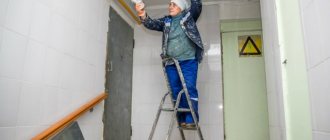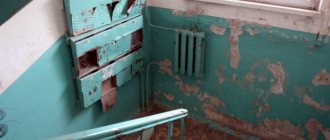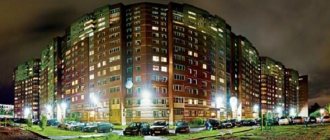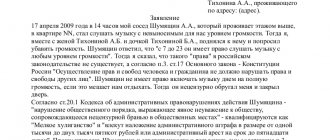Entrance area is an area of an apartment building that is in common use. Each of the residents has the opportunity to maintain cleanliness in the entrance at the proper level. In some cases, residents independently set a schedule for cleaning entrances in an apartment building. The priority order does not have a fixed form and can be drawn up taking into account the occupancy factor of the apartments and the needs of the owners. In other situations, the cleaning of entrances is carried out by persons hired by the management company. In this case, residents are charged a monthly fee. The general rules for maintaining cleanliness in apartment buildings are established by the housing legislation of the Russian Federation.
Normative base
The main legal act in this area is the Housing Code (Article 36). Issues of maintaining order in apartment buildings are regulated by the provisions of GOST R 51617-2000. The frequency of cleaning entrances and staircases is established by Decree of the State Construction Committee of the Russian Federation No. 170, which approved the “Rules and Standards for the Technical Operation of Housing Stock” on September 27, 2013.
Decree of the Government of the Russian Federation No. 290 dated 04/03/2013 approved the minimum size of work (their list). Cleaning of the territory of the house is carried out according to the rules for maintaining the property of an apartment building N 491 dated 08/13/2006. If the standards for maintaining cleanliness are not observed, citizens can draw up a letter of claim against the company that carries out the trust management of the property of the apartment building.
How much does the service cost?
The cost of cleaning entrances depends on the area of the apartment occupied by the owner. Payment is made based on tariffs per 1 sq. m. The management company calculates this amount based on upcoming costs.
The main expenses fall on the following items:
- staff salaries;
- purchase of consumables;
- payment of taxes;
- commission of payment systems;
- payment to contractors who maintain personal accounts, draw up receipts and deliver them to residents.
As a rule, accepted tariffs are reviewed once a year. Read more in this article.
Who is responsible for cleaning hallways?
The management company (MC) is required to maintain order in common areas (CP) in high-rise buildings. When there is none, then a homeowners association or other structure representing the interests of residents. Cleaning the entrance by the management company can be done by hiring an employee or engaging a cleaning company. All of them provide their services on a reimbursable basis.
Thus, who should clean the entrances to an apartment building? A citizen or legal entity selected by the Criminal Code for the role of cleaner. A contract is concluded between them (labor or for the provision of services).
What documents need to be prepared
The application can be accompanied by acts and conclusions of visiting commissions from the State Housing Inspectorate, SES, etc. They reflect non-compliance with the standards for cleaning the entrances of an apartment building. You can attach photographs that reflect the poor condition of the entrances. Your application must be registered. It is better to make two copies of the application at once in order to leave one for the addressee, and put a mark of acceptance on the second.
What is included in the cleaning of entrances
Order must be established throughout the entire territory of the MNP. This:
- staircase and its landing;
- elevator cabin;
- attics;
- basement;
- corridor;
- utility room
In addition, the entrance cleaner is required to periodically wet clean doors, windows, railings, radiators, grilles, window sills, etc.
Options for resolving the issue
If you want to resolve the issue with the current company and the lack of response to complaints, you can contact the supervisory authorities and the prosecutor's office. It is better to send the conclusions of supervisory authorities and responses from the Criminal Code to the prosecutor's office. Otherwise, as part of interdepartmental cooperation, the prosecutor’s office will independently send the claim there first. It will circulate in circles and will be difficult to track (although a certain period is always allocated for the consideration of applications and the applicant is notified that a letter has been sent to another department).
Frequency of implementation
The cleaning schedule for entrances to apartment buildings is established by regulations.
- Every day the floor is swept with a wet broom in the corridor of the 1st and 2nd floors, the area in front of the garbage receptacle and the elevator.
- Twice a year – wiping radiators and railings.
- Once a week – cleaning the front entrance.
- Once every 3-7 days - sweeping the remaining floors.
- Once a year - wiping windows, door panels, electrical panels.
- 2 times a month – washing the floors in the corridor and elevator.
Taking into account these rules, a schedule is drawn up, which should be available for review by all residents of the apartment building.
Standards and rules
The standards and rules for cleaning entrances require compliance with the following standards:
- strict adherence to the established schedule;
- regular dry and wet cleaning of corridors, elevators, stairs, flights and ramps, vestibules and halls;
- removing dust from window sills, grilles, railings, mailboxes, etc.;
- window cleaning;
- carrying out deratization and disinfestation;
- sanitary treatment of the garbage chute.
When carrying out sanitary and hygienic measures at the entrance, the staircases must be simultaneously ventilated. To do this, open the windows, frames and transoms. Read more in this article.
Payment
Monetary remuneration for such work is made at the established rate. The payment amount is included in the utility bill. Charges are generated monthly. The price for cleaning entrances is calculated taking into account the schedule and time standards for performing certain actions, as well as the employee’s salary. You should also consider the cost of consumables, detergents and additional equipment. If a cleaning company is involved to clean the entrances, then it sets the price. In this case, the invoice is issued by the management company, which in turn divides the amount indicated in it among all residents of the apartment building according to their share in the common property.
Rules for putting things in order
There is no need to have any qualifications to engage in such activities. Even despite the fact that now such positions may be called more favorable to the ear. For example, a cleaning service specialist. Oddly enough, to work with dirt you need to have a medical book with a completed medical examination and, accordingly, with marks made about it.
As a result, the purpose of cleaning is to eliminate this very dirt to prevent negative consequences from indoor pollution. Therefore, as a result, purity must be achieved by the hands of a person suitable for this. Otherwise, the conditions of the entrance will worsen from the point of view of all sanpins.
The emergence of conflict situations
Often, apartment owners are dissatisfied with the quality of services provided by the company providing trust management of property, including cleaning up the corridors and other areas of the entrance. Such situations may arise:
- if the work of the cleaner of the entrances of residential buildings was not carried out according to the approved standards or was not carried out at all;
- due to the negligence of the management company itself.
First, it is recommended to send an appeal to the management company with a request to conduct an inspection and take measures to eliminate deficiencies.
Filing a complaint about poor housekeeping
There is no set form for the form. However, a written request must comply with all rules for the preparation of official papers. Errors, blots, and strikethroughs are not allowed in the text. In addition, the complaint must not contain incorrect or obscene language. Misrepresentation of information is also unacceptable. The appeal can be handwritten or prepared in printed form. It can be signed by either one owner of real estate in an apartment building or several. In general, the complaint consists of three parts; we will describe each of them.
- Introductory. Includes information about the management company (full name, location address); information about the applicant or several (last name, first name, patronymic, zip code, city, street, house, apartment of residence, contact phone number).
- Main. The essence of the claim should be stated (in as much detail as possible); a reference to regulations is indicated; requirements are listed.
- Final. Consists of a list of attachments, date and signature (or several if the complaint is a collective one).
You can view/complain about poor cleaning on our website. It is recommended that the application be submitted in two copies, one of which with a note of acceptance is kept by the applicant. If management company employees refuse to register a document, then it can be sent by post by registered mail with acknowledgment of delivery.
What documents need to be prepared
There is no specific list of required documents to be submitted. In most cases, these are documents confirming the violation: photographs and videos. A copy of the agreement with the management company on the provision of services may also be attached. In addition, the applicant has the right to independently study the legislation and refer to those articles that are violated and attach a printout.
If residents do not have sufficient knowledge and time to resolve the issue, they can involve a representative. Then the complaint will need to be accompanied by a copy of a notarized power of attorney, giving the specialist the right to represent the interests of the owners of apartments in the apartment building in various authorities.
Options for resolving the issue
If the company carrying out trust management of the property of the house does not take any action or completely refuses to accept documents, then it is recommended to contact the competent authorities. Who should I complain to about the management company? You can send your application to the following departments:
- Rospotrebnadzor;
- prosecutor's office;
- court;
- Housing Inspection;
- administration of a district or locality.
The complaint is drawn up in an official form and contains the following information:
- name of the organ;
- its location;
- applicant's details (full name, registration address, telephone number);
- indication of violation;
- reference to a legal act;
- information that the appeal was sent to the Criminal Code, which ignored it;
- petition;
- date of;
- signature.
The form of the document is not important. The main condition is compliance with the rules of official style and clarity of requirements.
Questions
Zoya, 29 years old (Moscow): How should recreational areas in the house be cleaned?
Answer: The implementation of the principle of recreation in residential buildings is a promising direction in architecture. Now developers like to build interesting residential complexes with different buildings and floors of houses, as well as add various infrastructure to the territory. Unfortunately, the standards for such recreational sites have not yet been determined. And the question of including them in the cleaning schedule remains to be asked directly by the management company.
Matvey, 30 years old (Kursk): What is the status of the storage rooms on the staircase and should residents let cleaners in there (because, as a rule, only residents of some individual apartments have keys)?
Answer: Previously, residents actively used storage rooms on staircase landings as places to store large items (for example, bicycles) or dressing rooms for out-of-season clothes. Nowadays such premises cannot be found in new buildings. You need to look at the status of such a premises. Usually they belong to common property and cleaning should be carried out as for the space of staircases.
Arbitrage practice
Decision No. M-1457/2013 in civil case No. 2-1598/13 dated October 17, 2013, issued by the Bogorodsk City Court of the Nizhny Novgorod Region, may look interesting. The essence of the case is as follows - in the interests of a resident of the house, who is a pensioner and is unable to independently file a claim with the Criminal Code due to his age, the prosecutor appealed to the court with a demand to oblige the Criminal Code:
- clean entrances and other common areas;
- carry out deratization and disinfestation.
The defendant’s representative did not agree with these requirements, explaining that:
- the prosecutor had no right to go to court;
- payment for cleaning is not included in the tariff for repairs and maintenance of housing, and therefore should not be paid;
- deratization and disinfestation are being done, but residents simply do not see it;
- apartment owners were given an explanation that at the general meeting a decision could be made to include cleaning as part of the fee for repairs and maintenance (with a simultaneous increase in such fees).
What the court decided:
- Part of the prosecutor's claims for deratization and disinfestation must be rejected, since no evidence has been provided that these works are not being carried out (the burden of proof lies with the plaintiff - editor's note), and the testimony of witnesses on the plaintiff's side cannot properly testify to failure to perform this type of work (in accordance with Art. and Art. Code of Civil Procedure of the Russian Federation).
- Part of the claim for cleaning of entrances was also denied for the following reasons:
- the list of services and works is regulated by the method of managing apartment buildings, in the presented case, indicated in the agreement between the management company and the residents;
- the contract for the provision of the relevant service did not say; accordingly, it was not included in the payment for repairs and maintenance, and therefore should not have been provided.
Download for viewing and printing: Article 56 of the Civil Procedure Code of the Russian Federation “Obligation of Evidence”
Article 60 of the Civil Procedure Code of the Russian Federation “Admissibility of evidence”











